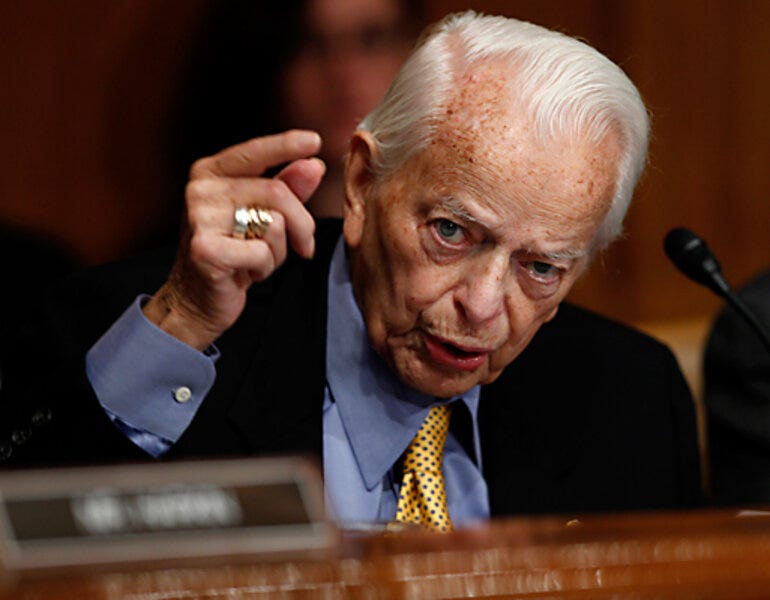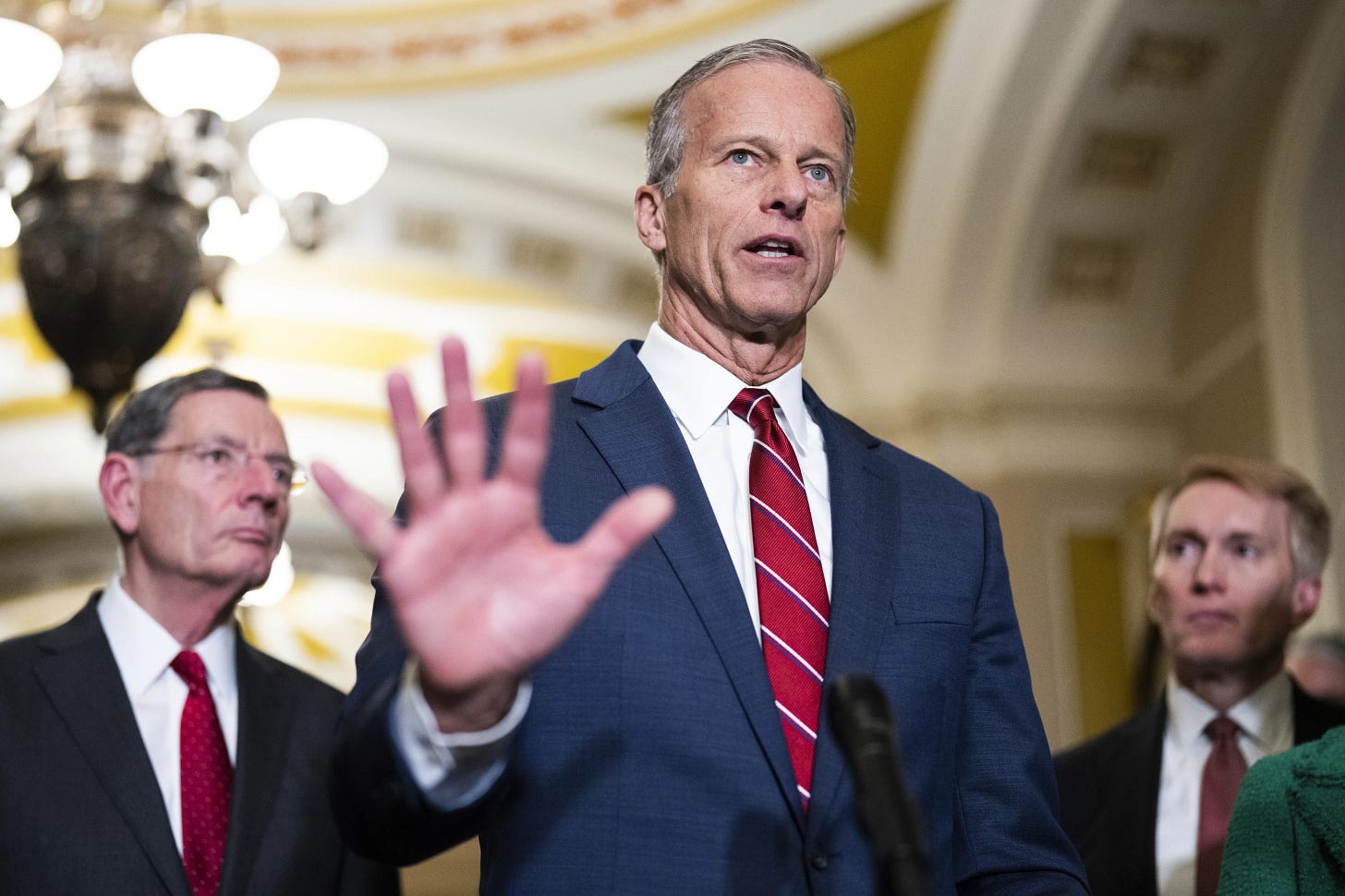She Wields a Powerful Red Pen
And everyone in Congress wants her attention
Elizabeth MacDonough is far from a household name. If she were walking down the street, it’s unlikely that anyone but the most dedicated political wonks would recognize her. And no one has ever cast a ballot with her name on it.
But, right now, she quietly wields as much power as almost anyone in Washington. That’s because, as Republicans march forward with their One Big Beautiful Bill, she’s the one who gets to decide how big it really is.
The proposed GOP package wouldn’t only cut taxes, reduce Medicaid spending, and strengthen border security. As I wrote last month, it would also do everything from constraining judges ruling against the Trump administration to preventing states from regulating AI.
But many of those provisions are unlikely to be in the final bill that reaches the president’s desk, due to the constraints of the budget reconciliation process, which Republicans are using to pass the package. Reconciliation is a special process that Congress allows that bypasses the filibuster in the Senate. It requires only a simple majority to pass instead of the 60 votes usually required to overcome the filibuster, and permits the party to push through an important agenda item with little to no cooperation from the other side. But to use reconciliation, the party in power — currently the GOP — has to follow a narrow set of restrictions.
That’s where MacDonough, the Senate parliamentarian and keeper of the chamber’s rules, comes in.
The most important reconciliation restriction is known as the Byrd Rule. It’s named for West Virginia’s Robert Byrd, a Democrat who served in the Senate from 1959 to 2010, longer than anyone else in US history. The Byrd Rule lays out a number of parameters: reconciliation bills can’t change Social Security, for example, and they generally can’t increase the deficit beyond a ten-year window.
Above all, every provision in a budget reconciliation bill actually has to be about the budget: that is, they have to produce a change in how much money the government either takes in (through taxes) or shells out (through spending).
Of course, by that metric, you could make any policy budgetary if you tried hard enough.
Let’s say I write a reconciliation bill that requires every American to read The Preamble at least three days a week.
Doesn’t pass muster with the Byrd Rule?
Easy. I’ll just amend it to levy a $1 tax on anyone who chooses not to subscribe. Now the bill would increase government revenue, right?
Not so fast. The Byrd Rule also says the change in revenue or spending can’t be “merely incidental” to the provision. You can’t include a policy change that just so happens to impact the government coffers. That impact has to be core to what the provision is trying to do.
But that’s something of a subjective standard, which leaves a fair amount of wiggle room. And, unfortunately, Senator Byrd didn’t leave us with much guidance. So it’s up to MacDonough, as the nonpartisan rules referee, to take a first pass at deciding which parts of the Republican package follow the rules, and which parts have to be left on the cutting room floor.
To understand how MacDonough makes these decisions, I spoke to two former Senate staffers — one Democrat, one Republican — who have watched the deliberations up close.
It starts with the majority party putting forward a reconciliation package (as Republicans have done with the One Big Beautiful Bill), and then the minority party picking out whichever sections they think might violate the Byrd Rule.
Each party can then go meet with MacDonough and her staff to hone their arguments for why a provision should or shouldn’t be allowed to remain in. “It’s kind of like office hours,” Bobby Kogan, a former Senate Democratic staffer, told me.
Once MacDonough has given her initial feedback, both parties sit down together to try to persuade her.
Sometimes, this takes place in a fancy conference room, set up almost “like a court of appeals,” former Republican aide Rohit Kumar said, with the parliamentarian playing the role of judge and Senate staffers from either party as the litigants.
But, just as often, it plays out in a much less formal setting.
“You literally go to the parliamentarian office on the first floor of the Capitol,” Kumar explained. “It is not a huge space. It’s not the kind of space that is pandemic-friendly. Like you’re sitting on top of each other, right? You are breathing somebody else’s breath.”
“So you just pile around” the parliamentarian’s desk, with books and binders cluttered about, Kumar continued. “You’re standing around. If you’re lucky, you get a seat. But probably not. And you just hash it out, like it’s a mini oral argument.”
Then, a few days later, both parties receive an email with the parliamentarian’s ruling.
In Washington-speak, this all-important huddle is known as a “Byrd bath.” Provisions stricken out of a package are known as “Byrd droppings.” (No, I’m not kidding.)
Reconciliation bills are often the most consequential pieces of legislation passed during a president’s term (think: Obamacare, the Trump tax cuts, the Biden-era Inflation Reduction Act), so these intense, bipartisan meetings — centered around one, unelected individual — can often decide huge pieces of public policy.
Let me give you an example.
In 2021, Democrats tried to use a reconciliation bill to raise the minimum wage to $15 an hour. “It had a budgetary effect, because it turns out, if you put a wage floor in the system, the economic model will tell you that fewer people will be employed and there’ll be revenue loss to the government as a result,” Kumar said.
But Republicans argued that the provision was not being included for “the purposes of reducing revenue,” Kumar explained. “It was being done for other purposes.” MacDonough agreed that the budgetary impact was “merely incidental.” Ergo, the federal minimum wage remains $7.25 an hour.
This year, there have been a whole lot of “Byrd droppings” falling out of the Republican bill. MacDonough has ruled against provisions that would have:
And more. Even an attempt to transfer the Space Shuttle Discovery from a museum in Virginia to one in Texas was axed. More provisions could be cut in the next few days, as the meetings with the parliamentarian continue — and some provisions could be resurrected, if Republicans rework them in ways that meet with MacDonough’s approval.
These meetings “can get heated,” Kumar admitted: a party’s whole legislative agenda is on the line, after all. But both he and Kogan expressed admiration for MacDonough, a former Justice Department trial attorney who has worked in the Senate for 25 years, the last 13 as parliamentarian. “She’s a lawyer’s lawyer,” said Kumar.
“Elizabeth takes her job really, really, really seriously and cares deeply about what she’s doing, and is not a hack,” said Kogan. “There are lots of Democrats who have decided she’s a secret Republican. Lots of Republicans have decided she’s a secret Democrat. Elizabeth is a straight shooter.”
“I don’t know better than a coin toss what party she is, if she’s registered with a party at all, or how she votes,” Kumar echoed. “I have no idea.”
Both praised her performance in a job that takes on renewed importance during every reconciliation fight, trying to parse guidelines that are anything but clear. “Like, what the f*** does ‘merely incidental’ mean, right? That’s not spelled out. It’s an impossible task,” said Kogan.
The main question at this juncture is whether Republicans will give MacDonough the same leeway. The parliamentarian wields a lot of power during reconciliation — but that’s only because senators typically follow what she says. But they don’t have to. Her “rulings” are really only the advice of an appointed functionary, given to the elected senators.
Senate parliamentarians have been fired before; and back in 1975, Vice President Nelson Rockefeller exercised his prerogative as president of the Senate to overrule the parliamentarian, something no VP has done since.
A majority of senators could also vote to ignore MacDonough if they want to. Republicans effectively did that on an unrelated matter in May, but it’s never happened during a reconciliation process.
Democrats faced pressure to ignore MacDonough in 2021, but ultimately didn’t. Senate Majority Leader John Thune pledged earlier this month that Republicans would respect her guidance this time as well.
And so, for the next few days, all of Washington will be glued to MacDonough’s pronouncements, in order to find out just how much the Republican budget bill can do.
How does she handle juggling all of that power every few years?
“There’s no hubris or holier-than-thou-ness or whatever you want to call it,” Kumar told me. “She’s a nice, normal human being that, episodically when parties are doing reconciliation bills, gets put in this position.”










I had to do a double-take reading this because after months of Republicans screaming about “unelected bureaucrats” (if they aren’t Elon Musk) while systematically firing inspectors general and stripping civil service protections from 50,000 federal employees (supposedly because their unelected-ness means they must be evil), suddenly seeing them show deference to MacDonough felt like stepping into an alternate reality. They’ll rail against career scientists at the FDA as illegitimate “deep state” actors, but then John Thune says firing the parliamentarian would be “akin to killing the filibuster” and multiple GOP senators are like “that’s just the process, we respect it.” Okay! I’m happy for everyone suddenly respecting processes because they are processes, but will that sentiment last when it comes to passing the bill?
Then I went digging into what right-wing media is actually saying about MacDonough and yeah, we’re definitely still in the same universe. Did you know she’s a “former Gore advisor” who is a “leech from the corpse of Harry Reid” who in an act of “animus” “took a hatchet” to “suck the life” out of the bill like a “wet blanket” because, as every one of the articles I found repeatedly mentions, she was “appointed by a Democrat” years ago? Did you know she is the swamp?
It’s just fascinating that Senate Republican leadership seems to understand they actually need some institutional guardrails to function, even while the broader party wages war on the concept of non-partisan expertise. I guess the difference is MacDonough’s rulings can be overruled if they really want to, whereas career civil servants in agencies might actually know things that contradict their policy goals, and therefore must be eradicated? Much easier to attack people who can’t fight back than to pick a fight with an institution you might need to work with later when the pendulum swings back.
Thank you, Gabe! This is exactly what I needed to know. We were debating this at our state representatives’ town hall on Monday, where I admonished everyone that the current administration does not respect guardrails, and questioned whether congress would respect the Byrd rule.